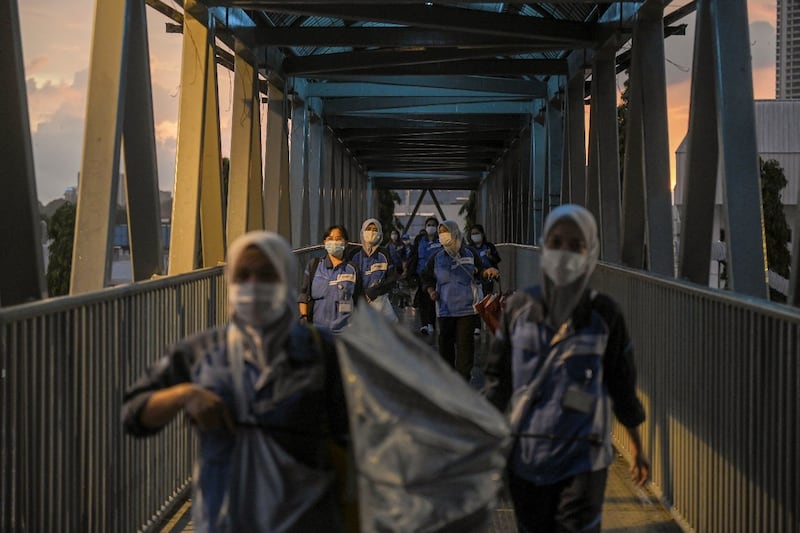As the eldest sibling in the family, Indonesian Rizky Ramadan felt duty-bound to leave his hometown of Medan for Malaysia four years ago to support his loved ones. However, he soon found himself “living a nightmare.”
He got a job as a gardener but his employer withheld his passport and started taking half of his salary of 1,200 ringgit (U.S. $260) each month, falsely claiming it was to repay his immigration agent, Rizky said.
The 24-year-old Indonesian had “no choice but to escape,” he recently told BenarNews outside the Indonesian embassy in Kuala Lumpur.
“I was young and unaware of my rights as a migrant worker,” he recounted.
“Not all employers are bad, but unfortunately there are some – and my experience serves as an example.”
Indonesia is one of the world’s largest source countries for migrant workers, with an estimated 9 million citizens working abroad in 2017, according to the World Bank. Only about 4.7 million of these workers are officially registered by the labor protection agency, leaving the rest vulnerable to exploitation.
Many end up in neighboring Malaysia, where cases of forced labor, trafficking and abuse are not uncommon.
Some 1.7 million Indonesians work in Malaysia, primarily in the agricultural and construction sectors, according to Indonesia’s envoy to Malaysia, Hermono, who goes by one name.
A recent report by the International Labor Organization found thatnearly a third of migrants employed as domestic help in Malaysia work under exploitative conditions, including high levels of isolation and restriction on their movement.
“The rampant abuses of Indonesian migrant workers being sold as human commodities require serious attention, but no ministry appears keen on enforcing the laws,” said Alex Ong, a Malaysia-based coordinator for Migrant Care, an NGO.
Migrant Care recorded an average of four forced labor cases per month last year, he said, adding that more robust collaboration between law enforcement agencies was needed.
Two weeks ago, Indonesian President Joko “Jokowi” Widodo and Malaysian Prime Minister Anwar Ibrahim committed their administrations to strengthening protection of migrant workers in Malaysia.

In April last year, the neighbors established a system to better safeguard Indonesian workers’ rights – especially of migrant domestic help – including through wage protection and complaint mechanisms.
Still, many Indonesian workers in Malaysia are skeptical about such agreements or unaware of what they mean for them, said Uli Rini, a domestic worker who has been in Malaysia for the past 13 years.
“Migrant workers, especially domestic workers, are not fully aware of the terms and conditions of the agreement,” said Uli, who is also the president of advocacy group the Indonesian Migrant Domestic Workers Association.
“They should know that they are entitled to holidays and the right to have a phone to communicate with their families. But many of them are still not allowed to have their own phones, they are not given leave or even a proper bed.”
‘No longer wish to be referred to as maids’
Despite the agreements, there has been little tangible change, Uli said.
“It’s just papers that they have signed,” she said. “We want our rights as workers to be recognized. We no longer wish to be referred to as maids or servants.”
Ilham Farizal Manurum, an Indonesian migrant worker in Kuala Lumpur, said he had lost hope in the effectiveness of various initiatives.
“Working in Malaysia is easy, except when you have a bad employer,” said Ilham, who has been in Malaysia for 10 years. “They cheat us out of our money, and there’s not much we can do in such situations.”
Malaysia’s Human Resources minister did not immediately respond to requests for comment this week.
Indonesia temporarily halted sending workersto Malaysia in July last year, accusing Kuala Lumpur of violating a recruitment agreement and putting them at risk of forced labor. But it lifted the ban in August.
Indonesia’s ambassador to Malaysia, Hermono, said this week that unless Malaysia focuses more on migrant protection it would affect bilateral relations.
“The way Indonesians feel is that some Malaysians look down upon our country, as if our people can be treated however they wish,” he told a crowd of international relations students at University Malaya on Tuesday.
“While some argue that these instances of unpaid wages, abuse, or torture are isolated, reported cases suggest otherwise,” he said.
Malaysia has taken steps to improve protections for migrant workers and was recently upgraded to the Tier 2 Watch List from the bottommost rung in the U.S. State Department's 2023 Trafficking in Persons Report, which assesses efforts by countries worldwide to combat human trafficking.
Countries on the Tier 2 Watch List are those whose governments do not fully meet the United States’ Trafficking Victims Protection Act of 2000’s minimum standards but are making significant efforts.
Delays in prosecution, insufficient interagency coordination and inadequate services for victims are hindering Malaysia’s efforts to improve the lot of migrant workers, the report said.
